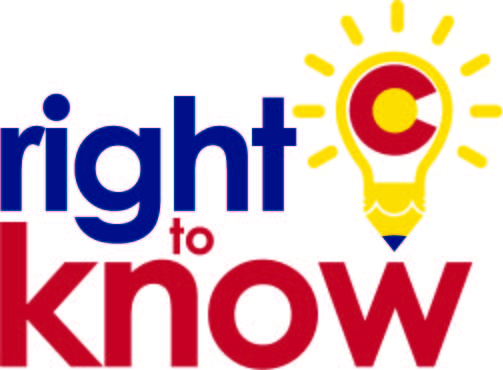By Jeffrey A. Roberts
CFOIC Executive Director
Colorado does a great job protecting the confidentiality of individual student records but suppresses far too much academic performance data at the school and district level, which can leave families, communities and researchers in the dark about how well groups of students are doing.
That’s the message being conveyed to policymakers and the public this week by a broad “Right to Know Coalition” of groups and organizations, including the Colorado Freedom of Information Coalition.
“We have a transparency problem in Colorado,” says a report card issued by the alliance. “… Taxpayers deserve this information. Civil rights groups need this information to ask important questions about fairness and equity in our schools. Families need this information to make decisions and advocate for their students.”
Colorado once was a model “for providing data to families about how schools and districts supported student performance,” the report card says, “but in recent years we have fallen to the bottom of the pack.”
The increased masking of data is due to the Colorado Department of Education’s interpretation of a student data privacy law passed by the state legislature in 2016, according to Van Schoales, president of A+ Colorado, the education reform advocacy group that leads the Right to Know Coalition.
The law “was not meant in any way to limit the reporting of student achievement data by race, income, or any other designation for grade level, school, or school district …,” Schoales wrote in 2018. But state officials decided that stringent disclosure rules were necessary to make sure publicly released information could not be traced to individual students.
Members of the Right to Know Coalition have been pushing for greater education data transparency since 2017, meeting with state education officials to discuss how more information could be made available. CDE relaxed its data privacy rules somewhat with last August’s release of state test results, giving the public a better look at how well certain groups of students performed.
Still, it suppressed 25 percent of school-level data by students’ eligibility for free- or reduced-priced lunches, the Right to Know Coalition says, meaning the public cannot see if those students met or exceeded academic expectations. It suppressed 65 percent of grade-level data in schools and districts by free- or reduced-price lunch eligibility.
The coalition also is concerned about the suppression of data on the academic performance of groups such as English language learners, students with individual education programs and students of differing racial or ethnic backgrounds.
A+ Colorado has compared academic achievement data available to the public in 2018 with data available in 2014, before the new reporting rules went into effect. For example, more than 400 fourth graders in the Roaring Fork School District in Glenwood Springs took the state’s math assessment in 2018, but information about whether they met expectations was suppressed. It wouldn’t have been suppressed before the new rules, according to the organization.
Also suppressed in 2018: Information about whether 200 students at Monte Vista Middle School met grade-level expectations in the English language arts and math assessments. The data would have been available in 2014.
The Right to Know Coalition praised new data visualization tools unveiled earlier this month by the Colorado Department of Education “as a strong step in the right direction,” but stressed that the tools “do not address the reporting rules that suppress data, nor do they make information easy to understand by families, communities and students.” The resources provided on CDE’s dashboards “require high levels of data literacy” to understand and use, the report card says.
A poll conducted earlier this month for A+ Colorado showed that most Coloradans want the state to prioritize transparency in the public reporting of academic data as long as measures are taken to safeguard students’ privacy.
The state excels at protecting the data of individual students, the report cards says, and recently “doubled down” on investing in its data security system. While the Right to Know Coalition believes the state must safeguard the privacy of individual students’ information, “the public needs to be made aware of the significant limitations the state has put on their ability to access school- and district-level student academic performance data,” the alliance says in a news release.
The report card stresses there have been no known breaches of personally identifiable information through protected student records or the aggregate reporting of achievement data.
In an emailed statement, CDE Communications Director Jeremy Meyer wrote that the department agrees with the Right to Know Coalition’s core beliefs about data transparency and data privacy, “but we also feel that the report exaggerates some of the department’s data reporting practices to the point of creating misperceptions about the data that is publicly available.”
CDE provides access to “a great depth of information about school performance through our accountability frameworks and the many, many data tools on our website,” including information about the performance of groups of students such as English language learners and students qualifying for free- or reduced-priced lunches, he wrote. Other tools, he added, show the performance of smaller student subgroups by using a mean scale score.
“If anything, our data is so voluminous that parents may not have the easiest time finding the information that is most important to them,” the statement says, adding that CDE is working to create more easy-to-understand online data tools.
“Balancing the important values of data privacy and data transparency requires compromise,” Meyer wrote. “We want to make sure parents and taxpayers understand that a full breadth of school performance data, including the performance of important groups of students, is available to them in a variety of formats. The only exceptions are when student groups are very small and reporting on their performance could reveal the performance of individual students.”
The Right to Know Coalition has a website with more about the need for education data transparency. Other members of the coalition: Advocacy Denver; Colorado Association for Bilingual Education; Colorado Children’s Campaign; Colorado Latino Leadership, Advocacy & Research Organization; Colorado League of Charter Schools; Colorado Youth Congress; Democrats for Education Reform; DSST Public Schools; Education Reform Now; Faithbridge; Gary Community Investments; Independence Institute; Padres & Jóvenes Unidos; Students for Education Reform; Shift Research Lab; Strive Prep; Together Colorado; Transform Education Now; and Young Aspiring Americans for Social & Political Activism.
Follow the Colorado Freedom of Information Coalition on Twitter @CoFOIC. Like CFOIC’s Facebook page. Do you appreciate the information and resources provided by CFOIC? Please consider making a tax-deductible donation.





